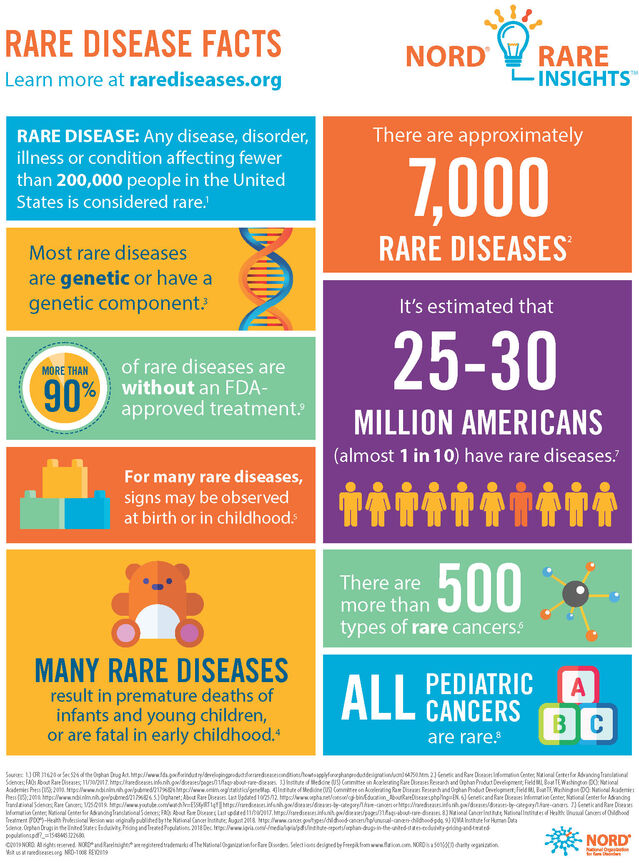Stress
People With Rare Diseases Need Better Social Support
A new study shows which types of support benefit those with rare diseases.
Posted October 14, 2020 Reviewed by Gary Drevitch
by Brooke Bryson, M.S. and Kathleen Bogart, PhD
A rare disease or disorder is defined as affecting fewer than 200,000 Americans each year. There are more than 7,000 different rare disorders. Combined, 1 in 10 Americans has a rare disorder, so the experience of rare is actually common. Although each disorder is unique, people with rare disorders experience universal challenges including a lack of social support and treatment options (Bryson et al., 2019). Two thirds of people with rare disorders feel they do not get sufficient support through the healthcare system. Lack of support and other challenges may explain why adults with rare disorders report significantly greater anxiety and depression, and poorer quality of life, than the general public and even people with more common disorders (Bogart & Irvin, 2017).

A new study published today in Health Psychology examined how different types of social support influence life satisfaction for adults with rare disorders (Bryson & Bogart, 2020). We tested whether support was directly related to life satisfaction, or whether support related to life satisfaction by reducing the negative effect of stress on life satisfaction.
Psychologists distinguish between four types of social support, all of which may be important to the life satisfaction of people with rare disorders. Emotional support includes feeling understood and validated by others. Informational support is advice from others. Tangible support is practical help with tasks of daily living. Companionship support, which has received less attention than other types of support, includes engaging in leisure activities with people and generates a sense of belonging.
This large-scale project surveyed 1,203 adults living with any rare disorder in the United States (Bryson & Bogart, 2020). A total of 232 different rare disorders were represented. Participants were asked to rate their levels of the four types of social support, stress, and satisfaction with life. We found that only companionship support and emotional support predicted life satisfaction, and companionship support was the strongest predictor. So, both companionship and emotional support are important predictors of life satisfaction for folks with rare disorders, regardless of how much stress they are experiencing. This study highlights the importance of companionship support, suggesting this little-studied type of support deserves more attention. Below we discuss ways to improve companionship and emotional support for rare disorders.
Support Conferences and Mentoring
People with rare disorders and their families want to meet others with their condition (Huyard, 2009), but most have never done so. Many rare disease organizations hold support groups or conferences for people with rare disorders to connect with others like them and learn from experts in the field. One such example is the Moebius Syndrome Foundation Conference, which supports people with this facial paralysis disorder. To understand the effects of the conference on social support, we surveyed 50 adults with Moebius syndrome who did or didn’t attend the conference one year (Bogart et al., 2017; Bogart & Hemmesch, 2016). Companionship and emotional support were some of the main benefits of attending, with one participant noting that the conference was the “rare place I feel normal” (Bogart et al., 2017). Being surrounded by others who share one’s condition offers a unique opportunity for destigmatizing companionship and emotional support, which normalizes, reduces isolation, and promotes solidarity.
Giving social support can be more powerful than receiving it. People who have been connected to the rare disease community for a long time find meaning in volunteering, advocating, and mentoring others who are newer to the disorder.
Making Social Support Accessible
There are many accessibility issues to these sources of support, such as distance, cost, and a lack of accommodations for the varied symptoms of rare disorders. Some organizations are taking steps to address some of these issues by providing more regional options, resting rooms, and using video conferencing. The COVID-19 pandemic has moved most conferences and support groups online, meaning people with rare disorders from all over the world can connect without contending with travel. Spending time face-to-face with others is likely one of the most impactful aspects of support groups and conferences. Although promising, it remains to be seen whether videoconferencing can fully replicate these rich social support benefits.
Support Beyond the Diagnosis
A lack of social support is felt across all types of rare disorders, and cross-disorder solidarity provides strength in numbers. National Organizations for Rare Disorders and Global Genes host conferences for people with any rare disorder can come together, support each other, and learn how to advocate for policies supporting their quality of life. Together, people with rare disorders can advocate for resources and funding for psychosocial research and support.
People with rare disorders are frequently misunderstood or disbelieved by others. Greater public awareness of rare diseases could lead to more people having a better understanding of these diverse conditions, thus increasing the availability of emotional support and reducing stigma.
Brooke Bryson, M.S. is a psychology Ph.D. candidate at Oregon State University. Kathleen Bogart, PhD is an associate professor of psychology at Oregon State University.
References
Bogart, K. R., Frandrup, E., Locke, T., Thompson, H., Weber, N., Yates, J., Zike, N., & Hemmesch, A. (2017). “Rare place where I feel normal”: Perceptions of a social support conference among parents of and people with Moebius syndrome. Research in Developmental Disabilities, 64, 143-151. doi: 10.1016/j.ridd.2017.03.014.
Bogart, K. R., & Hemmesch, A. R. (2016). Benefits of support conferences for parents of and people with Moebius syndrome. Stigma and Health, 1(2), 109-121. doi: 10.1037/sah0000018
Bogart, K. R., & Irvin, V.L. (2017). Health-related quality of life among adults with diverse rare disorders. Orphanet Journal of Rare Diseases, 12(177). doi: 10.1186/s13023-017-0730-1
Bryson, B., & Bogart, K. R., (2020). Social support, stress, and life satisfaction among adults with rare diseases. Health Psychology, 39(10), 912-920. https://doi.org/10.1037/hea0000905
Bryson, B., Bogart, K. R., Atwood, M., Fraser, K., Locke, T., Pugh, K., & Zerrouk, M. (2019). Navigating the unknown: A content analysis of the unique challenges faced by adults with rare diseases. Journal of Health Psychology. Advance online publication.
Huyard C. (2009). What, if anything, is specific about having a rare disorder? Patients’ judgements on being ill and being rare. Health Expectations, 12, 361–70.


